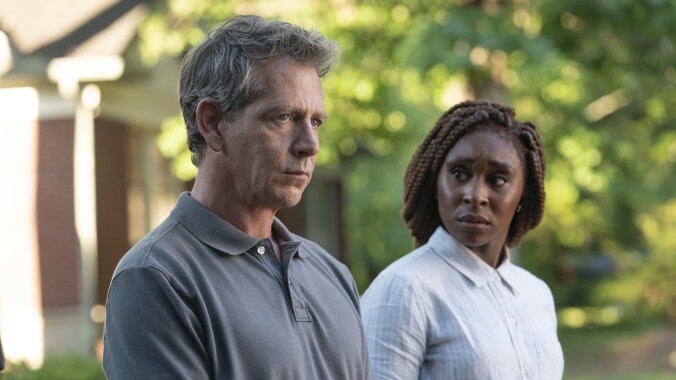So on the one hand, “Foxhead” is all about getting to that final nod and the carnage that comes after, an arc that began when Ralph Anderson first saw the mutilated corpse of Frankie Peterson. It would seem to move slowly on its way, if it’s moving at all. But the show is more like Andy and Yunis, Holly and Ralph, and Jack and his demon siling down the highway, at a pace that only seems sedate because we’re in the car. The speed is constant, steady, unflagging, so it’s easy to miss that it’s barreling along at 70 MPH.
Everything accelerates in “Foxhead,” named for the grim mask that El Cuco wears atop his nearly-finished Claude Bolton mask, which in turn is growing in to replace his Terry Maitland mask. El Cuco’s need to feed increases, as does Jack’s fear, pain, and revulsion. (The first kill is, unfortunately, “full of cancer,” a revelation made by the voice that wafts up like a foul scene from Jack’s backseat.) Andy has raced right ahead to “whither thou goest,” which seems like a lot, but also feels appropriate somehow. Ben Mendelsohn is so goddamned good you can watch acceptance rocketing toward Ralph like an asteroid; he says he has to come to it in his own time, but really it’s coming to him. Alec and Howard move slowly toward the joint realization that they need to hit the road, too, then suddenly arrive in Cecil, like the dawn. And one minute, poor old Sam is just looking at a cave map, and the next, he’s being led away by a Foxhead while his sister and grandfather barrel through a crowd, determined to stop the worst from happening.
You could look at the pace, and at the rate at which things are speeding up now, and say that The Outsider has been stringing out its plot all the while, spreading the story in increasingly thin layers to stretch things out to 10 episodes of television. But it’s more like a slow crescendo and a slow accelerando in one, like the off-balance theme that percolates throughout the series. The tempo might increase slightly, but more likely it’s your own heart rate that increases. And that’s because yes, The Outsider keeps moving forward, even if it seems to do so slowly, but at the same time, it’s moving outward. In one of many scenes in cars, Holly tells Ralph that El Cuco’s desire is straightforward: It wants nothing more or less than to “perpetuate its own existence… to survive.” And that’s a straight line, but it’s also a spiderweb.
It’s like the pattern we see on the concrete when Holly and Andy arrive in Cecil for an errand or two, but which ultimately sees Holly visit the church in which Yunis sits alone. There’s a point of impact, and then the area of damage that surrounds. That’s how El Cuco operates: He puts on a face, commits an atrocity, and feasts as pain ripples outward in waves.
It’s also how The Outsider operates, more so in “Foxhead” than in any previous chapter. As the grandfather rips off the Foxhead mask, we hear the snap and see the light of a flashbulb; later, the same wakes Ralph from his uneasy sleep on a shitty couch. It’s the second time we see him rise. The first time, he goes in search of some disturbing sound, only to find that the source of the noise is Claude, who is himself looking for an intruder and the source of a different noise. Seale is thinking about taking his anger management class for a second time. Later, he and Claude will fill the same cell. Throughout the episodes, cars circle, arrive, depart, stand still, until they all blur together. Ralph tells a story about his mother, and a gap of 15 years. Later, Alec talks about the taste of copper, a sensation he last experienced some 14 years earlier. In that case, it was in battle. “Could you imagine going into a battle with your eyes shut?” Jeannie asks Ralph. And when Andy and Yunis set out together, it’s with the goal of trading war stories. There are others. There are many, many others.
Holly tells Ralph his experience involving his mother’s death was likely a coincidence. It’s an echo, and seems significant because of the significance he places upon it. But this is also an episode of echoes, the web that surrounds the straight line of the story. The Outsider seems complicated, surreal, off-kilter, but like the monster at its center, its motivations are actually not so mysterious: It draws out its story and surrounds it with a spiderweb of tone, theme, and poetry.
Stray observations
- Holly’s hair was so pretty this episode, in the scene in the church in particular.
- Did Grandpa get scratched?
- The dialogue in this episode was especially great. Particularly liked “I got a solid left to go with those aforementioned rights.”
- Book stuff: In the book, the character Claude is spending time with is his mother, and while I actually miss that character quite a lot, Seale adds an extra layer of tension and danger to the proceedings, if only because he sure seems like he might make a good replacement for Jack.









































